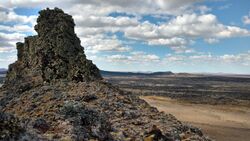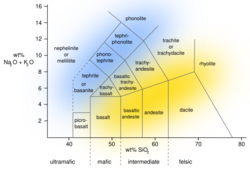Chemistry:Alkali basalt

Alkali basalt or alkali olivine basalt is a dark-colored, porphyritic volcanic rock[2] usually found in oceanic and continental areas associated with volcanic activity, such as oceanic islands, continental rifts and volcanic fields.[3] Alkali basalt is characterized by relatively high alkali (Na2O and K2O) content relative to other basalts and by the presence of olivine and titanium-rich augite in its groundmass and phenocrysts, and nepheline in its CIPW norm.[4][5]
Geochemical characterization

Alkali basalt is chemically classified as a rock in region B (basalt) of the total alkali versus silica (TAS) diagram that contains nepheline in its CIPW norm. Basalts that do not contain normative nepheline are characterized as sub-alkali basalts, which include tholeiitic basalts and calc-alkaline basalts.[6]
Petrography
The groundmass of alkali basalt is mainly composed of olivine, titanium-rich augite and plagioclase feldspar and may have alkali feldspar or feldspathoid interstitially, but is poor in silica minerals, such as hypersthene and quartz.[4]
Phenocrysts are ubiquitous in alkali basalt and, similarly to the groundmass, are usually made up of olivine and titanium-rich augite but can also have plagioclase and iron oxides with lower frequency.[3][4]
Geologic context
Alkali basalt can be found in areas associated with volcanic activity, such as oceanic islands (Hawaii, Madeira,[7] Saint Helena,[8] Ascension, etc.), continental rifts and volcanic fields.[3] Continental alkali basalt can be found in every continent, with prominent examples being the Rio Grande Rift (USA), the East African Rift and the Pali-Aike volcanic field.[9]
The results from the gamma ray spectrometer on Venera 8 on Venus suggest it landed on alkali basalt.[10]
References
- ↑ Skewes, Milka Alexandra; Stern, Charles R. (1979). "Petrology and geochemistry of alkali basalts and ultramafic inclusions from the palei-aike volcanic field in Southern Chile and the origin of the patagonian plateau lavas" (in en). Journal of Volcanology and Geothermal Research 6 (1–2): 3–25. doi:10.1016/0377-0273(79)90044-1. Bibcode: 1979JVGR....6....3S.
- ↑ "Basalt | Definition, Properties, & Facts". https://www.britannica.com/science/basalt.
- ↑ 3.0 3.1 3.2 Haldar, S. K. (2017). Platinum-Nickel-Chromium Deposits. Elsevier. pp. 45. ISBN 9780128020418.
- ↑ 4.0 4.1 4.2 Winter, John DuNann (2001). An Introduction to Igneous and Metamorphic Petrology. Upper Saddle River, New Jersey: Prentice Hall. pp. 148, 182. ISBN 0132403420.
- ↑ Irvine, T. N.; Baragar, W. R. A. (1971). "A Guide to the Chemical Classification of the Common Volcanic Rocks". Canadian Journal of Earth Sciences 8 (5): 523–548. doi:10.1139/e71-055. Bibcode: 1971CaJES...8..523I.
- ↑ 6.0 6.1 Le Maitre, R. W.; Streckeisen, A.; Zanettin, B. et al., eds (2002). Igneous Rocks: A Classification and Glossary of Terms. Cambridge University Press. pp. 36–37. ISBN 9780521662154. https://archive.org/details/igneousrocksclas00mait.
- ↑ Hughes, D. J.; Brown, G. C. (1972). "Basalts from Madeira: A petrochemical contribution to the genesis of oceanic alkali rock series" (in en). Contributions to Mineralogy and Petrology 37 (2): 91–109. doi:10.1007/BF00371069. ISSN 1432-0967. Bibcode: 1972CoMP...37...91H.
- ↑ Baker, Ian (1969). "Petrology of the Volcanic Rocks of Saint Helena Island, South Atlantic" (in en). GSA Bulletin 80 (7): 1283–1310. doi:10.1130/0016-7606(1969)80[1283:POTVRO2.0.CO;2]. ISSN 0016-7606. Bibcode: 1969GSAB...80.1283B.
- ↑ Farmer, G.L. (2005). Rudnick, R.L.. ed. Treatise on Geochemistry: The crust. Gulf Professional Publishing. pp. 97. ISBN 9780080448473.
- ↑ Ulivi, Paolo; Harland, David M (2007). Robotic Exploration of the Solar System Part I: The Golden Age 1957-1982. Springer. pp. 159–160. ISBN 9780387493268.
External links
 |
